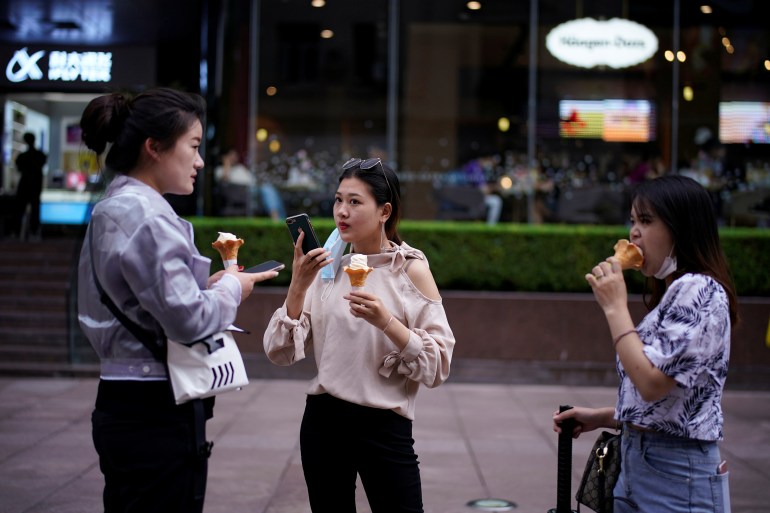On ‘China’s Instagram’, women find a space to discuss the routine and taboo
Xiaohongshu has become the go-to platform for young women to discuss everything from fashion to domestic violence.

Taipei, Taiwan – Alice Guo sparked a flurry of interest on Xiaohongshu, the Chinese social media and e-commerce platform, when she decided one day in 2021 to share advice on preparing for a job interview.
Chinese-born Guo was living in Toronto at the time, grounded by the COVID-19 pandemic after years of bouncing between jobs in Vancouver, Hong Kong, New York, Los Angeles and Shanghai.
Keep reading
list of 4 items‘Profoundly unjust’: Reactions to court overturning Weinstein’s conviction
Farm suicides, anger mount in Indian villages that Modi promised hope
Why is Elon Musk feuding with Australia and Brazil over free speech?
“I started to do a few posts and one day, I just posted about the interview process that got me into a venture capital firm,” Guo, who is in her early 30s, told Al Jazeera.
“I woke up the next day, just all of a sudden, it went from maybe like 20 followers to 500 followers overnight.”
Before long, Guo’s page, called “Ali is Working Hard” in Chinese, built up an audience of about 45,000 followers, drawn by a mix of professional advice and updates on her daily life in Canada.
Guo’s page is among the countless accounts on Xiaohongshu that have tapped into a user base primarily made up of young, highly-educated women, both in major Chinese cities and in emigrant communities overseas.
Though lacking the global name recognition of Facebook, Instagram or X, Xiaohongshu has become the go-to platform for Millennial and Gen-Z Chinese women since its launch in 2013 – as just a set of humble PDF documents offering travel advice.
The platform, which has been described as China’s answer to Instagram, had 200 million monthly active users in 2022, according to self-reported data, about 70 percent of whom were women.

While Xiaohongshu translates as “Little Red Book” in English – the same name as Mao Zedong’s famous text – the platform shares little else in common with the Chinese leader’s collection of speeches and writings.
Rather than promoting revolutionary values, the platform, which combines blog posts and short videos, exemplifies China’s post-Communist consumerist culture, which is aspirational, ambitious and globally minded.
And for women in a society where political dissent is tightly controlled and socially conservative attitudes hold sway, Xiaohongshu has become something of a sanctuary for like-minded peers to freely discuss topics of common concern.
Users share content on an expansive range of issues, from relatively uncontentious topics like work life and fashion, to semi-taboo – albeit not overtly political – topics like divorce, domestic violence, and perceptions that women who have not gotten married and had children by their early 30s are failures or undesirable.
“Those are all stereotypes, but it’s there. It’s real and it creates anxiety,” Daniela, a Xiaohongshu user who asked to be only referred to by her first name, told Al Jazeera.
“And, of course, a lot of really talented women with amazing backgrounds are facing really big career challenges,” added Daniela, who posts content related to women’s career advancement and empowerment to her more than 125,000 followers.
Despite Beijing’s heavy censorship of the Internet, discussions on contentious issues are often allowed on Xiaohongshu, especially if they focus on personal experiences rather than greater systemic issues in Chinese society.
Still, there are red lines.
One Xiaohongshu user, who asked to not be named, told Al Jazeera that posts she made about her experience of freezing her eggs were deleted, even though the Chinese government is pushing women to have more children.

The platform has also cracked down on some displays of conspicuous consumption, warning users to be more “empathetic” and not flaunt their wealth as it is “still out of reach for a large proportion of people”.
Users have similarly been discouraged from over-editing their photos and videos.
Part of Xiaohongshu’s appeal is that it embodies a polished, or “jinzhi,” feminine aesthetic that requires “not only money, but also cultural and educational capital” to attain, setting it apart from more male-dominated platforms like WeChat and Weibo, according to Jia Guo, a professor in gender and cultural studies at the University of Sydney.
“Jinzhi has always been a big part of Xiaohongshu,” Guo told Al Jazeera. “What is behind this jinzhi lifestyle is classed consumer culture in post-socialist China and classed distinction of taste. Not only money, but also cultural and educational capital is needed to be jinzhi. Such a middle-class urban lifestyle is popular on Xiaohongshu and it is highly gendered too – often presented by young women.”
Since it was founded more than a decade ago, Xiaohongshu has also become adroit at understanding its users, thanks to its “game changer” algorithm, said Sheng Zou, an assistant professor at Hong Kong Baptist University who researches the digital economy.
Zou said that Xiaohongshu users often cite the algorithm as being part of its allure.
“Most would agree that the algorithm is precise and effective in detecting and/or predicting their content preferences or aspects of their identity, more so than some other popular apps that they are using,” Zou told Al Jazeera.
“You can go really deep into different communities,” James Hsu, a Taiwanese-Canadian based in China who uses Xiaohongshu to promote coaching and consulting services, told Al Jazeera, explaining how a “lot of influencers actually set up group chats that you can just join by going to their profile page”.
“It feels more like an actual resource than just like pure entertainment, because you could definitely go in there to learn things like hard skills, or soft skills, like how to start a business, like how to interview for a job, and there are many, many cross-sections with that,” Hsu said.
Profit problems
Despite its loyal and growing following, Xiaohongshu has struggled until recently to make money.
In its early days, Xiaohonghsu had a strong e-commerce component, where Chinese consumers could source reliable foreign products – a boon in a country rife with fake goods and knockoffs.
The platform gradually shifted over the years towards lifestyle and educational content, and more recently, with the rise of short-form video, livestream shopping and influencer brand deals.
Olivia Plotnick, the founder of the Shanghai-based marketing agency Wai Social, said that Xiaohongshu appears to have found its niche with such deals.
“They’ve had a lot of problems trying to monetize for the past several years, and I think they’ve potentially found a good way to do it with livestreaming recently,” Plotnick told Al Jazeera.
These deals do not come cheap, as Chinese influencers can charge between three and five more times than their Western counterparts, Plotnick said.
An influencer with 10,000 followers can command $300 to $500 per post, while an influencer with upwards of 300,000 followers can command $5,000, she said.
Plotnick said such partnerships are attractive for brands as Xiaohongshu has always been strong at raising brand awareness, even if its e-commerce component lags behind retail giants like Taobao and Tmall.
Meanwhile, the platform stands apart from competitors thanks to a livestreaming style that provides a “quiet luxury” feel, she said.
The approach appears to be paying off.

Xiaohongshu, whose top investors include Alibaba, Tencent and United States-based GGV Capital, made its first profit last year, taking in $500m on revenues of $3.7bn, the Financial Times reported in March, citing people briefed on the matter.
Xiaohongshu did not reply to a request for comment.
As it seeks to shore up its financial position, Xiaohongshu has also been trying to diversify its user base.
Despite boasting some 200 million users, its customer base is still small in comparison with platforms such as Weibo, Douyin and WeChat, which claim between 600 million and 1.2 billion-plus users.
Xiaohongshu’s drive to grow its user base includes outreach efforts to men and those living outside of China’s “tier one” and “tier two” cities, such as Beijing and Shanghai.
Xiaohongshu is also gaining traction outside mainland China, including in Hong Kong, Taiwan and Western cities with large Chinese diaspora populations, such as Toronto, where Alice Guo of “Ali is Working Hard” is based.
Guo said one-third of her audience comes from North America and she is an avid consumer of diaspora-created content herself.
“It’s like my Yelp, it’s like my Google. So if I want to find where to eat, what to eat, I look for it on Xiaohongshu. Especially in Toronto, there are tonnes of Chinese, so almost every single restaurant has a good review, and I can find some content on it,” Guo said.
“If I want to read a book and know how good it is, I go to Xiaohongshu for it. And then if I want to know about makeup, I go to Xiaohongshu.”